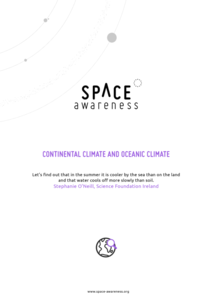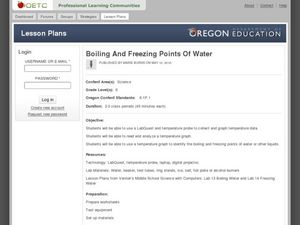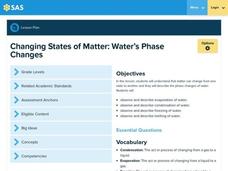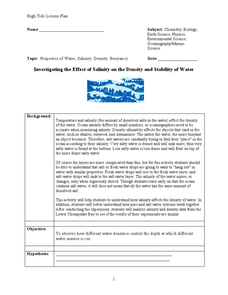Curated OER
Properties of Matter
A collection of ten slides reveals bright graphics and photos. Though the title is "Properties of Matter," the content is incoherent. You will find a couple of slides on chemical reactions, a few on the example of the S.S. Hindenburg...
American Chemical Society
Can Liquids Dissolve in Water?
How does food coloring work? Classes watch a demonstration showing liquids dissolving in liquids. In groups, they then explore the ability of other liquids to dissolve in water (alcohol, mineral oil, and corn syrup) by setting up and...
American Chemical Society
Recrystallization Test
Crystallize the answer to the question that has been investigated since the first of four lessons: What is the unknown crystal? Pupils have examined, crushed, and dissolved four samples plus an unknown as an exploration of the properties...
Purdue University
Yucky Water? No Problem!
Young scholars study the process of water filtration in a three-part STEM lesson. After analyzing samples of dirty water, teams design and build their own filtration systems and measure their efficiency.
Space Awareness
Continental Climate and Oceanic Climate
There's nothing better than a cool breeze blowing in from the ocean. Scholars explore how water affects change in temperature using a hands-on experiment on climate. They use measurement tools to compare the continental and oceanic...
Curated OER
Boiling and Freezing Points of Water
Challenge your sixth graders with this lesson about the freezing and boiling points of water. In these activities learners graph temperature data, read and analyze information, and identify the freezing and boiling points of water and...
Pennsylvania Department of Education
Changing States of Matter: Water’s Phase Changes
Third graders observe the properties of water and in its different states. For this states of matter lesson, 3rd graders view a video, read The Magic School Bus at the Waterworks and experiment with freezing, melting and boiling water to...
Curated OER
Galileo's Thermometer: Measuring the Density of Various Unknown Liquids
Sprouting scientists explore the concept of density by making mass and volume measurements for five different liquids. From these measurements, they calculate densities. They apply their learning to explain Galileo's thermometer works...
Curated OER
Where in the world is the Hydra Electron?
Walk your class through the journey water takes once it leaves your kitchen sink, all the way through the water cycle. Demonstrations support your lecture. This plan is thoroughly written, but ideally you would follow it up with water...
Curated OER
Measuring the Volume of Water Discharge for a Stream or Canal
Students study how to measure and calculate the volume of water flowing down a stream or canal and use simple tools to make measurements. Next, students determine how many people cold live off the volume of water measured. Finally, they...
Centers for Ocean Sciences
Ocean and Great Lakes Literacy: Principle 1
Is your current lesson plan for salt and freshwater literacy leaving you high and dry? If so, dive into part one of a seven-part series that explores the physical features of Earth's salt and freshwater sources. Junior hydrologists...
Baylor College
How Can We Find Out What Is in Water?
Using paper chromatography, water watchers discover that several substances might be dissolved even though they aren't visible. In this case, you will prepare a mixture of three different food colorings for them to experiment with. A...
Curated OER
Effects of Water Pollution on Aquatic Organisms
Students investigate water pollution. They develop an understanding of the behavior of organisms, of the structure and properties of matter, and of natural and human induced hazards by conducting lab tests. They present their data...
Curated OER
What Are The Properties of Sea Water?
Ninth graders conduct research on the subject of sea water. They use a variety of resources to obtain information. There are helpful resource links listed in the lesson. In conjunction with the research students make inquiry of the...
Curated OER
Investigating the Effect of Salinity on the Density and Stability of Water
Water with varying amounts of dissolved salt are dyed and then used to compare densities. The objective is to discover the effect of salinity, and therefore density, on ocean water on the stability of the ocean. Many branches of science...
Purdue University
Bio Inspired Design Paper Flowers
Can paper flowers have some of the same properties as real flowers? First, learners investigate how water is absorbed into a flower through capillary action by using real flowers, yarn, and paper. Then, they have an opportunity to create...
Curated OER
Matter: The 3 States of Water
The states of water are the focus of this PowerPoint. The presentation includes definitions of liquids, solids, and vapors. It also includes examples and illustrations of each of the states of water and information about how water can...
Curated OER
Water 1: Water and Ice
Students discover the forms water can take. In this hands-on science lesson, students examine how water can change from a solid to a liquid and then back again.
Curated OER
Water and Ice
Students explore water and ice. In this physical science lesson, students participate in a science inquiry and observe the characteristics of ice and water. Students compare the differences between a solid and liquid and record their...
Curated OER
Science: Water Quiz
In this science: water quiz worksheet, students answer twenty questions, not interactively about the properties of water, then scroll down to check their answers.
American Chemical Society
Density of Water
We know solids have a density we can measure, but what about liquids? Lesson explores this concept and allows scholars to explore the relationship between volume and density. Graphing and analysis questions round out the activity.
Columbus City Schools
ABC: Acid Base Chemistry
Bubble, bubble, boil and trouble! What causes common substances like baking soda and vinegar to react the way they do? Welcome your junior chemists to the wonders of acid-base chemistry using a comprehensive and fun resource. Engage them...
Virginia Department of Education
The Colligative Properties of Solutions
How can you relate colligative properties of solutions to everyday situations? Pupils first discuss the concepts of density, boiling and freezing points, then demonstrate how to accurately determine the boiling and freezing point of...
Curated OER
Sink or Float?
Have your class explore density and buoyancy using this resource. Learners read the book Who Sank the Boat, and use several items, such as rubber balls, bottle caps, wood, and other household items to conduct an experiment. Using a tub...
Other popular searches
- Water Properties
- Chemical Properties of Water
- Physical Properties of Water
- Properties of Water Salinity
- Science Properties of Water
- Properties of Water Labs
- Water Chemistry Properties
- The Properties of Water
- Three Properties of Water
- Water Science Properties
- Properties Water Evaporation
- Water +Science +Properties

























